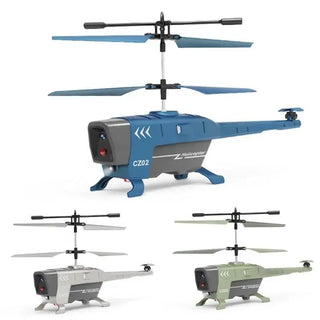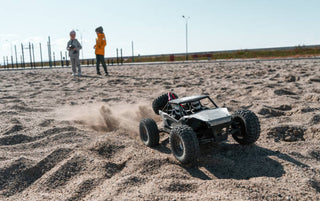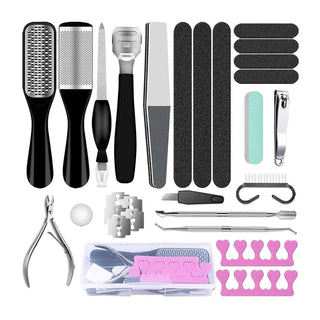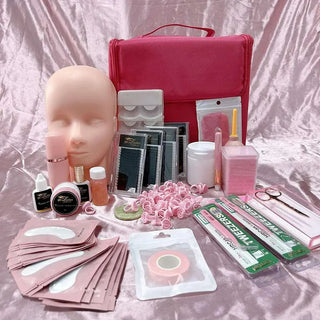So, you're thinking about getting into the world of RC cars? That's awesome! It's a really fun hobby, but it can feel a bit much when you're just starting out. There are so many kinds of cars, parts, and terms flying around. It's easy to get confused and maybe even pick something that isn't right for you. But don't worry, this guide is here to help you find some good RC cars for beginners. We'll break down what you need to know so you can pick a great first car and have a blast right from the start.
Key Takeaways
- Look for good RC cars for beginners that are tough and can take a few bumps.
- Make sure the RC car is easy to use and doesn't need a lot of complicated fixes right away.
- A responsive control system is key for good RC cars for beginners, making them easier to drive.
- Consider getting extra batteries and a good charger to keep the fun going longer.
- Connecting with other RC car fans can really help you learn and enjoy the hobby more.
Understanding Different Types of RC Cars

Choosing your first RC car can feel overwhelming, but understanding the different types available is a great first step. It really boils down to where you plan on driving it. Are you thinking smooth pavement, or are you picturing tearing through dirt and grass? This choice will heavily influence the type of RC car that's best for you. Let's break down the main categories:
On-Road RC Cars
These RC cars are built for speed and handling on smooth, flat surfaces. Think of them as the sports cars of the RC world. They typically have lower ground clearance and use tires designed for maximum grip on pavement. If you're interested in racing or just cruising around on sidewalks or parking lots, an on-road car is a solid choice. They aren't great for off-road use, though, so keep that in mind. Here's a quick rundown:
- Designed for smooth surfaces like asphalt and concrete.
- Lower ground clearance for better handling.
- Specialized tires for maximum grip.
- Ideal for racing and high-speed cruising.
Off-Road RC Vehicles
Off-road RC vehicles are built to tackle rough terrain. They have higher ground clearance, robust suspension systems, and aggressive tires that can handle dirt, gravel, grass, and even small jumps. These are your monster trucks, buggies, and rock crawlers. If you want to bash around in your backyard or explore trails, an off-road RC vehicle is the way to go. Just don't expect to win any races on a paved track. Consider the suspension design for handling different surfaces.
- Designed for rough terrain like dirt, gravel, and grass.
- Higher ground clearance to clear obstacles.
- Durable suspension systems for absorbing impacts.
- Aggressive tires for traction on loose surfaces.
All-Terrain RC Models
All-terrain RC models try to strike a balance between on-road and off-road performance. They're not the best at either, but they're decent on a variety of surfaces. These are often a good choice for beginners who aren't sure where they'll be driving their RC car most of the time. Buggies are a common example of all-terrain vehicles. They can handle some pavement and some off-road conditions without too much trouble. They offer versatile performance across multiple surfaces, making them easier to handle while you discover your preferences.
- Designed to perform adequately on both smooth and rough surfaces.
- Moderate ground clearance.
- Tires that offer a compromise between grip and traction.
- A good starting point for beginners who want versatility.
Choosing the right type of RC car depends on your intended use and the terrain you'll be driving on. Consider where you'll be spending most of your time and pick the type that best suits those conditions. Don't be afraid to start with an all-terrain model and then specialize later as you gain experience.
Key Features to Look For in Good RC Cars for Beginners

So, you're thinking about getting into RC cars? Awesome! But with so many options, how do you pick a good one, especially when you're just starting out? Don't sweat it. Here's what I think are the most important things to keep in mind.
Durability and Build Quality
Honestly, this is probably the most important thing for beginners. You're gonna crash. A lot. So, you need a car that can take a beating. Look for models from brands like Traxxas or ARRMA, which are known for making tough cars. Check out reviews and see what other people say about how well a car holds up. It's worth spending a little extra upfront to get something that won't break after a few runs. Also, consider the availability of replacement parts. If something does break (and it probably will), you want to be able to fix it without too much trouble.
Ease of Use and Maintenance
You don't want to spend more time fixing your RC car than actually driving it, right? Look for "RTR" (Ready-to-Run) models. These come mostly assembled, so you can get started quickly. Simple designs are usually better for beginners. Fewer complicated parts mean less that can go wrong. Also, think about the battery system. NiMH batteries are a good starting point because they're pretty easy to charge and handle.
- Easy access to the battery compartment is a plus.
- Simple chassis designs make maintenance easier.
- Look for models with clear instructions and online support.
I remember when I first got into RC cars, I bought this super complicated model. It looked cool, but I spent more time trying to figure out how to fix it than actually driving it. It was so frustrating! So, trust me, start simple.
Control System Responsiveness
You want a remote control that feels good in your hand and gives you smooth, predictable control. You don't want something that's jerky or too sensitive. Most hobby-grade RC cars use 2.4GHz radios, which are reliable and have good range. Some remotes even let you adjust the throttle, so you can limit the speed while you're learning. This is a great feature for beginners. Look for terms like "proportional control" or "dual rate adjustment" in the specs. A good remote control can make a huge difference in your driving experience.
Here's a quick comparison of control system features:
| Feature | Description
Choosing the Right Power System for Your First RC Car
Choosing the right power source is a big deal when you're getting into RC cars. It affects how long you can play, how fast your car goes, and how much maintenance you'll need to do. Let's break down the options.
NiMH Batteries for Beginners
NiMH (Nickel-Metal Hydride) batteries are often recommended for beginners because they're pretty forgiving. They don't need as much babying as other types, and they're less likely to cause problems if you don't treat them perfectly. They're a solid starting point for learning the ropes.
- Easier to charge and discharge compared to LiPo batteries.
- Lower risk of fire or explosion if mishandled.
- More affordable than LiPo batteries.
LiPo Batteries for Advanced Performance
LiPo (Lithium Polymer) batteries are the go-to for more experienced RC enthusiasts. They pack a serious punch in terms of power and can give your car a noticeable speed boost. However, they're also more sensitive and require more careful handling. If you want to upgrade your RC car's performance, LiPo batteries are the way to go, but make sure you know what you're doing.
- Higher energy density, resulting in longer run times.
- Lighter weight compared to NiMH batteries.
- Capable of delivering higher discharge rates for increased power.
LiPo batteries demand respect. Overcharging, over-discharging, or physically damaging them can lead to fires or explosions. Always use a LiPo-specific charger and follow the manufacturer's instructions carefully. Storage is also important; keep them in a fireproof bag when not in use.
Quality Charger Importance
No matter which type of battery you choose, a good charger is a must. A cheap or unreliable charger can damage your batteries, shorten their lifespan, or even create a safety hazard. Invest in a quality charger with features like automatic shut-off, temperature monitoring, and balance charging. This is especially important for LiPo batteries, but it's a good idea for NiMH batteries too. Think of it as an investment in the longevity and safety of your RC car batteries.
Here's a quick comparison table:
| Feature | NiMH Batteries | LiPo Batteries |
|---|---|---|
| Ease of Use | Simple | Requires more attention |
| Performance | Moderate | High |
| Cost | Lower | Higher |
| Safety | More forgiving | Requires careful handling |
| Charging | Simpler charging requirements | Requires a LiPo-specific charger |
Essential Accessories for Good RC Cars for Beginners
So, you've got your first RC car! Awesome. But the fun doesn't stop there. To really get the most out of it, you'll need a few extras. These aren't just nice-to-haves; they'll extend your playtime, keep your car running smoothly, and save you from frustration down the road. Think of them as investments in your RC fun.
Additional Battery Packs
The battery that comes with your RC car probably won't last as long as you'd like. Seriously, it's usually the first thing you'll want to upgrade. Having extra battery packs means you can keep the fun going without waiting for a recharge. For beginners, Nickel-Metal Hydride (NiMH batteries) are a good starting point. They're more forgiving when it comes to charging and discharging. As you get more experienced, you might consider Lithium Polymer (LiPo) batteries, which offer more power and longer run times, but they do require more careful handling and charging.
- NiMH: Easier to use, safer, but less powerful. Good for starting out.
- LiPo: More power, longer run times, but require more attention to charging and storage.
- Always match the battery voltage and connector type to your RC car's specifications.
Getting a second battery is like having a spare tank of gas. It just keeps the good times rolling. Plus, you won't be stuck waiting around while your only battery charges.
Quality Charging Equipment
Don't skimp on the charger! A good charger is super important for battery life and safety. Look for one with features like automatic shut-off, temperature monitoring, and balance charging. Balance charging is especially important for LiPo batteries, as it ensures each cell is charged evenly, which can extend the battery's life and prevent damage. A quality charger is an investment that pays off in the long run by protecting your batteries and your RC car.
Basic Tool Kit
RC cars need maintenance, and you can't do that with just any old screwdriver. A dedicated RC tool kit is a must. Here's what you should have:
- Metric hex drivers (1.5mm, 2.0mm, 2.5mm): These are essential for most screws on RC cars.
- Nut drivers (5mm, 7mm, 8mm): For tightening nuts and bolts.
- Needle-nose pliers: Great for grabbing small parts and reaching tight spots.
- Screwdrivers: Both Phillips head and flathead screwdrivers will come in handy.
Having the right tools makes maintenance easier and prevents you from stripping screws or damaging parts. Trust me, a good tool kit is worth its weight in gold when you need to make a quick repair at the track or in the field.
Budgeting for Your First Good RC Car for Beginners
It's easy to get carried away when you're first getting into RC cars. There are so many cool models and upgrades, but it's important to set a budget and stick to it. This will help you avoid overspending and ensure you get the most bang for your buck. Let's break down the different price points and what you can expect at each level.
Entry-Level RTR Models
Entry-level Ready-to-Run (RTR) models are a great starting point for beginners. These typically range from $100 to $200. At this price, you'll get a fully assembled car with everything you need to start driving, including the remote control, battery, and charger. The performance is decent, but don't expect top-of-the-line speed or durability. These are perfect for learning the basics without a huge investment. You can find some good beginner RC cars in this range.
Mid-Range Options
Stepping up to the mid-range, which is around $200 to $300, you'll see improvements in motor quality, chassis materials, and electronic components. These cars are generally more durable and offer better performance than entry-level models. If you're serious about getting into the hobby and want something that will last a bit longer and handle more abuse, this is a good place to start looking. You might also find more all-terrain RC models in this category.
Considering Long-Term Costs
Don't just think about the initial purchase price. There are other costs to consider, such as:
- Additional Batteries: The battery that comes with your RTR car probably won't last very long. Extra battery packs can cost $30-$80 each.
- Quality Charger: A good charger is essential for maintaining your batteries and ensuring they last. Expect to spend $40-$100 on a decent charger.
- Replacement Parts: Things break, especially when you're learning. Having a small stock of common replacement parts can save you time and frustration. Budget for things like gears, axles, and suspension components.
It's often better to spend a little more upfront on a reputable brand. This can save you money in the long run because the car will be more durable and parts will be easier to find. Plus, better brands often have better support and resources for beginners.
The Importance of Community and Support for Good RC Cars for Beginners
RC cars can be a blast, but let's be real, sometimes things go wrong. That's where the RC community comes in! Having a solid support system can seriously impact how much you enjoy the hobby, especially when you're just starting out. It's not just about fixing broken parts; it's about learning, sharing, and getting inspired by others who love RC cars as much as you do.
Online Forums and Groups
Online forums and groups are goldmines of information. Seriously, if you've got a question, chances are someone else has already asked it and gotten a helpful answer. These platforms are great for troubleshooting issues, finding tips and tricks, and even discovering new RC spare parts you might need. Plus, it's a great way to connect with other enthusiasts and share your experiences.
Local RC Clubs and Tracks
If you want to take your RC experience to the next level, check out local RC clubs and tracks. These places offer a chance to meet people in person, learn from experienced drivers, and even participate in friendly competitions. It's a fantastic way to improve your skills and get a feel for the RC community firsthand. Plus, many clubs offer beginner-friendly events and workshops to help you get started.
Manufacturer Support and Parts Availability
Choosing a brand with good customer service and readily available parts is super important. You don't want to be stuck waiting weeks for a replacement part or struggling to find answers to your questions. Brands like Tamiya, ARRMA, and Traxxas are known for their strong support systems, making it easier for beginners to overcome challenges. Make sure to check for additional power sources for your RC car.
Having a reliable support network can make all the difference in your RC journey. Whether it's online forums, local clubs, or manufacturer support, don't underestimate the value of connecting with others and seeking help when you need it. It's all part of the fun!
Starting with RC cars can feel tricky, but having friends and a good group around you makes it way easier. They can share tips, help fix things, and even race with you! Want to learn more about finding your RC car crew? Head over to our website for all the details.
Wrapping It Up
So, there you have it. Picking your first RC car doesn't have to be a headache. Just think about where you'll drive it, how much you want to spend, and what kind of support you'll need. Getting a good car from the start means you'll have more fun and less frustration. Remember, this hobby is all about enjoying yourself, learning new things, and maybe even making some new friends. Go ahead, pick a car, and get out there!
Frequently Asked Questions
How fast do beginner RC cars actually go?
Most beginner-friendly RC cars, especially the 1/10 scale electric ones that are ready-to-run (RTR), can hit speeds of about 25-35 miles per hour. Crawler RC cars are much slower, usually going around 5-15 mph. For someone just starting out, 30 mph is plenty fast and exciting!
What's the difference between 2WD and 4WD for a beginner?
A 2WD (two-wheel drive) car powers only the back wheels. They're simpler, easier to fix, and help you learn how to control the throttle better. A 4WD (four-wheel drive) car powers all four wheels, giving you better grip, especially on loose dirt or when climbing. They're usually more stable but also more complex. Many people suggest 2WD for absolute beginners because of its simplicity.
How long does an RC car battery last?
The battery life depends on its size (measured in mAh) and how you drive. A common 3000mAh NiMH battery might give you 10-15 minutes of playtime. A LiPo battery of a similar size could last 15-25 minutes or even longer. Basically, the higher the mAh number, the longer your car will run.
Are hobby-grade RC cars waterproof?
Many modern hobby-grade RTR RC cars, especially from brands like Traxxas, have waterproof or water-resistant electronics. This means you can drive them in wet conditions. Always check the specific model's details to be sure. If you do drive in the wet, make sure to dry your car thoroughly afterward. If you're building a kit car, you'd usually need to buy waterproof electronics separately if you want this feature.
What basic tools do I absolutely need to start?
For basic maintenance, you'll definitely need metric hex drivers (1.5mm, 2.0mm, and 2.5mm) and a 7mm nut driver. A pair of needle-nose pliers is also super useful. Using good quality RC tools helps prevent stripping the screws on your car.
Should I get an electric or gas-powered RC car as a beginner?
It's generally better to start with an electric RC car. They are easier to use, make less noise, and don't need messy fuel. Electric cars also give you instant power. You'll spend more time driving and less time trying to fix complicated engine problems, which can be frustrating for new hobbyists.











